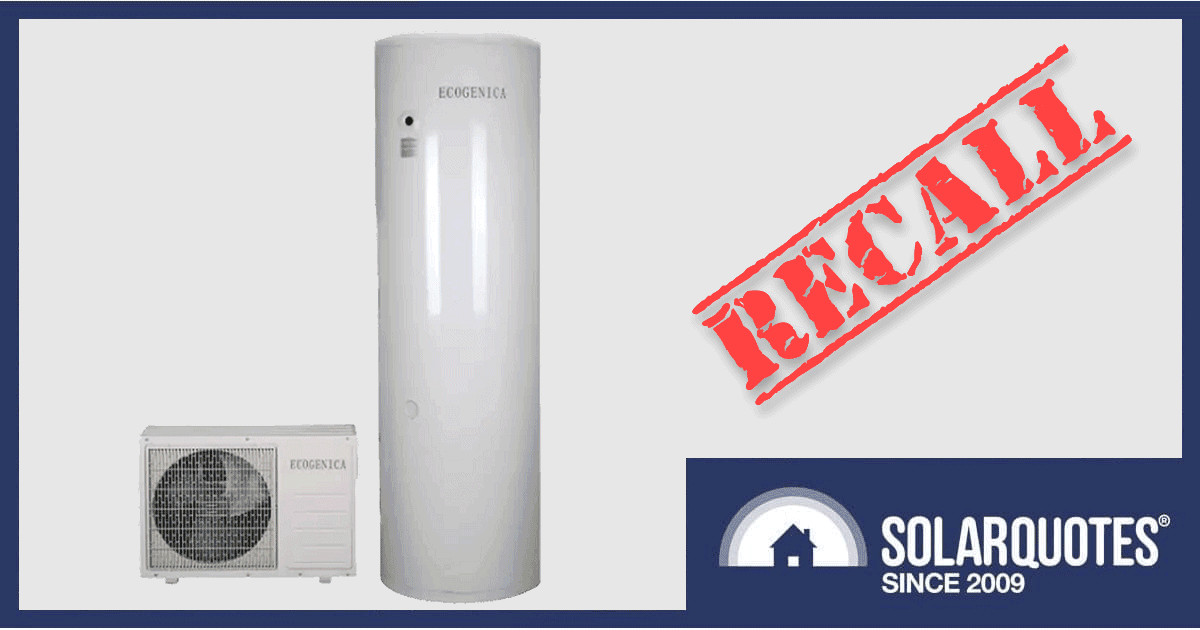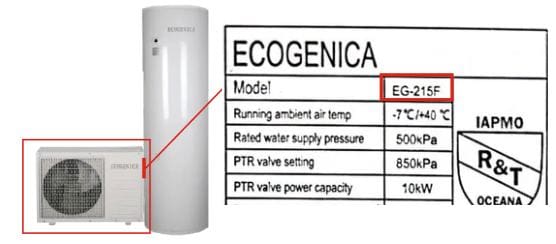Australia’s national consumer product safety regulator has published a recall notice for certain Ecogenica EG-215F heat pump hot water systems over an issue related to electrical safety.
The ACC’s Product Safety division published the recall notice on Tuesday, which applies to Ecogenica EG-215F systems where the control panel was installed inside the heat pump unit. Systems where the control panel and display box are installed outside the heat pump are not affected by this recall.
According to the recall notice, those with affected systems run the risk of someone coming into contact with live electrical parts when accessing the control panel to change the settings, with the potential for serious injury or death from electric shock. Owners are advised not attempt to access the control panel.
The Ecogenica EG-215F model number can be located on the compliance plate that is situated on the right-hand side of the heat pump unit.
The units were sold by Eco Alliance Pty Ltd in New South Wales and Victoria between 5 May 2022 and 13 September 2023. How many are affected was not mentioned.
The remedy involves affected Ecogenica EG-215F owners registering their heat pump with Eco Alliance by email ([email protected]) to schedule an authorised technician to repair the unit. A business hours telephone number is also provided: 1300 082 596.
HPHWS Popular In Victoria And New South Wales
A heat pump hot water system (HPHWS) is the most efficient way heat water pretty much anywhere south of Brisbane. They’ve been popular in NSW and Victoria thanks largely to incentives in both states additional to Small-scale Technology Certificates (STCs) – the same virtual bits of paper that Australia’s solar panel rebate is based on.
In Victoria, a state incentive of around $490 is available for upgrading an inefficient gas hot water heater to HPHWS, or up to $840 when replacing an inefficient electric unit. In New South Wales, additional incentives can range between $400 and $670 when replacing an electric water heater or between $190 and $310 when replacing a gas one.
HPHWS uptake in Victoria and New South Wales has seen more than 104,000 units installed across the two states over a recent 12-month period.
Choosing A Heat Pump Hot Water System
The Ecogenica EG-215F situation appears to be one of the few electrical safety-related recalls listed by Product Safety of a HPHWS in Australia. But that doesn’t mean all installations here are of good quality.
Like anything, there are some great products and some not so great. Price can (but not always) be a bit of a guide, e.g. under $2,000 and you may end up with something noisy, inefficient and unreliable. Installed prices for good quality units range from around $3,000 to $5,000. But a dog’s breakfast can be made of the best HPHWS gear by shoddy installation.
With heat pump popularity only growing, so too are the number of products available here. It can be a puzzle trying to figure out what may be best for your circumstances. One of the challenges is they aren’t (yet) subject to Minimum Energy Performance Standards (MEPS) and energy rating labels in Australia.
This heat pump hot water system guide by SolarQuotes founder Finn Peacock can clear up some of the confusion. It details how the systems work, and how to buy a good one. The guide covers topics including efficiency, cold weather, noise levels, brands, installation, rebates, cost and more. It also includes a comparison table where you can compare specifications and estimated pricing of a bunch of HPHWS models available in Australia side-by-side.



 RSS - Posts
RSS - Posts



The article says:-
“A heat pump hot water system (HPHWS) is the most efficient way heat water pretty much anywhere south of Brisbane. ”
Personally Im sure that the statement is technically correct, while being practically wrong. Im using Evacuated tube Solar heating that is topped up with PV generated Solar Power instead of using Grid electricity. I have a tiny 10W water pump as my moving components instead of a big compressor and in my case im sure that zero cost in terms of dollars and environment beats these hands down…..Im sure not in a hurry to change my system to one of these environmental disasters…..Living next to the ocean on the East coast I cant get split systems to live 20 years with corrosion…. My storage tank however with semi regular anode replacements will last longer than I do………
I wouldn’t be at all worried if the move back to electric storage heaters was put in place. With the Grid regularly wanting to know what to do with excess solar generation in the middle of the day this sure looks like a possible solution to me that is a win for everyone.
Andy
Hi Andy,
Evacuated glass tubes are marvellous I’ll grant you that. Sadly for split solar hot water services, having a pump can be unreliable. I always wanted a Solahart quality tank on the roof, close coupled to a glass tube collector that would just thermosiphon but they would be an expensive custom build.
Might also add that in the last week with rain and overcast my PV system 6.5kw still generates enough export to drive the storage tank element (2400w…yes its smaller than most elements are….for a reason….still can heat the same qty of water just takes longer with less draw) around midday for a few hours.
There will be some days where that simply isn’t possible, but I suspect that I’ll pull from Grid for less than 20 days a year…..The heatpump mind you is pulling happily for 365 days of that year…… assuming it hasn’t fallen over due to moving component syndrome
Andy